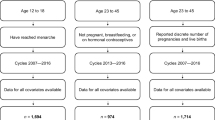Abstract
Disparities in health between immigrant and non-immigrant pregnant women in the United States is well documented, but few have documented disparities before pregnancy. Using the National Health and Nutrition Examination Survey (1999–2006), we examined the health of reproductive-aged women (8,095), sorted by immigrant and pregnancy pregnant US-born (P-US), pregnant foreign-born (P-FB), non-pregnant US-born (NP-US), and non-pregnant foreignborn (NP-FB). P-US women were 5.2 times more likely to report illicit drug use than P-FB women. NP-US women were 3.7 times more likely to report illicit drugs use, 45% less likely to have a normal BMI, 2.0 times more likely to binge drink, 7.6 times more likely to smoke, 1.6 times more likely to engage in moderate physical activity, and 1.7 times more likely to use birth control than NP-FB women. The lower prevalence of numerous destructive health behaviors among preconceptional immigrant women is an important finding.
Similar content being viewed by others
References
Camarota S. Immigrants in the United States, 2007: A profile of America’s Foreign-born Population. Center for Immigration Studies. 2007. http://www.cis.org/immigrants_profile_2007. Retrieved on 23 June 2009.
Camarota S. Births to Immigrants in America 1970–2002. Center for Immigration Studies. 2005. http://www.cis.org/articles/2005/back805.html. Retrieved on 22 June 2009.
Ruhl C, Moran B. The clinical content of preconception care: Preconception care for special populatons. Am J Obstet Gynecol. 2008;S:S384–8.
Fuentes-Afflick E, Lurie P. Low birth weight and Latino ethnicity. Examining the epidemiologic paradox. Arch Pediatr Adolesc Med. 1997 ;151:665–74.
Gollenberg A, Pekow P, Markenson G, Tucker K, Chasan-Taber L. Dietary behaviors, physical activity, and cigarette smoking among pregnant Puerto Rican women. Am J Clin Nutr. 2008;87:1844–51.
Qin C., Gould J. Maternal nativity status and birth outcomes in Asian immigrants. J immigr Minor Health. 2008; published online 12/14/08.
Atrash H, Johnson K, Adams M, Cordero J, Howse J. Preconception care for improving perinatal outcomes: the time to act. Matern Child Health J. 2006;10:S3–11.
Dolan S, Biermann J, Damus K. Genomics for health in preconception and prenatal periods. J Nurs Scholarsh. 2007;39:4–9.
Johnson K, Posner S, Biermann J, Cordero J, Atrash H, Parker C, Boulet S, Curtis M. Recommendations to improve preconception health and healthcare—United States. MMWR Recomm Rep. 2006;55(SS-6):1–23.
Moos M, Cefalo R. Preconceptional health promotion: a focus for obstetric care. Am J Perinatology. 1987;4:63–7.
Henshaw S. Unintended pregnancy in the United States. Fam Plann Perspect. 1998;30:24–9.
Boulet S, Yang Q, Mai C, Mulinare J, Pfeiffer C. Folate status in women of childbearing age, by race/ethnicity—United States, 1999–2000, 2001–2002, and 2003–2004. MMWR. 2007;55:1377–80.
Wingo P, Kulkarni A, Borrud L, McDonald J, Villalobos S, Green D. Health disparities among Mexican American women aged 15–44 years: national health and nutrition examination survey, 2999–2004. Am J Public Health. 2009;99:1300–7.
Dubowitz T, Subramanian S, Acevedo-Garcia D, Osypuk T, Peterson K. KIndividual and neighborhood differences in diet among low-income foreign and U.S. born women. Women Health Issues. 2008;18:181–90.
Frisbie W, Cho Y, Hummer R. Immigration and health of Asian and Pacific Islander adults in the United States. Am J Epidemiol. 2001;153:372–80.
Fuentes-Afflick W, Hessol N, Eperez-Stable E. Testing the epidemiological paradox of low birth weight in Latinos. Arch Pediatr Adolesc Med. 1999;153:143–7.
Peak C, Weeks J. Does community context influence reproductive outcomes of Mexican origin women in Sand Diego, California? J Immigr Health. 2002;4:125–36.
Acknowledgments
Support for this project was provided by a grant from the RWJF New Connections program.
Author information
Authors and Affiliations
Corresponding author
Rights and permissions
About this article
Cite this article
Xaverius, P.K., Salas, J. & Tenkku, L.E. Preconception Wellness: Differences in Health by Immigrant Status. J Immigrant Minority Health 14, 216–222 (2012). https://doi.org/10.1007/s10903-010-9424-7
Published:
Issue Date:
DOI: https://doi.org/10.1007/s10903-010-9424-7




